You’ll typically need about €1,300–€1,600 a month to live comfortably in Latvia, with non‑rent expenses for a single around €982 and a 1‑bed city‑center flat averaging €524. Expect utilities and internet of roughly €309 extra, groceries and basics to be inexpensive, and public transport passes near €39. Salaries average close to €1,000 take‑home, so rent can eat a big share of income — keep going to see detailed budget breakdowns and tips.
Cost of Living Overview and Monthly Budgets
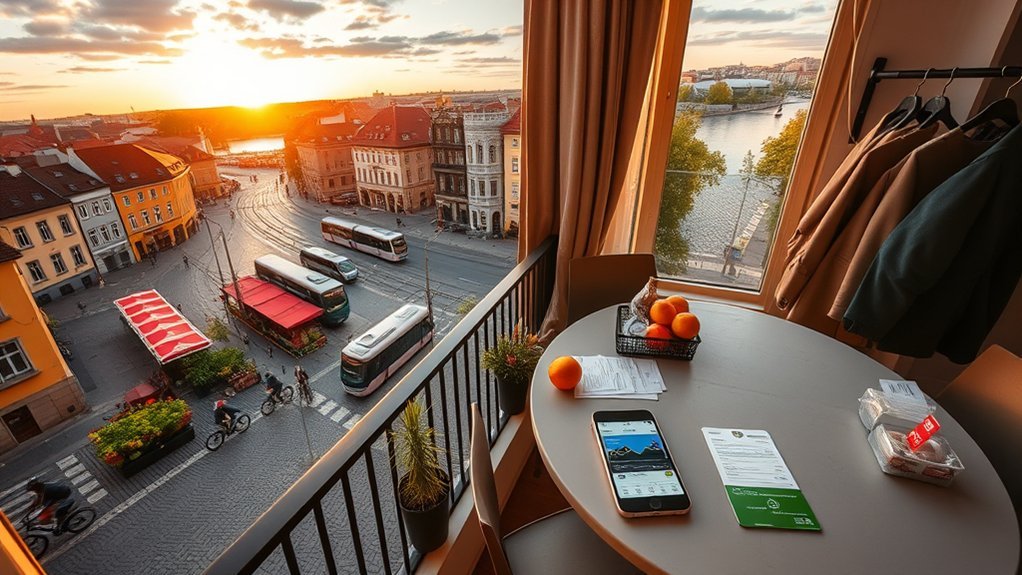
While Latvia’s overall cost of living stays well below many Western European countries, you can expect monthly non-rent expenses of roughly €982.40 for a single person and about €3,283.70 for a family of four; add average rents—around €523.68 for a 1‑bed city‑center flat or €645.45 for a 3‑bed outside center—to estimate total monthly budgets.
Latvia offers lower living costs: expect about €982 monthly non-rent for singles, €3,284 for a family, plus rent.
You’ll find utilities (heat, electricity, water) average €291.75/month and reliable internet at €17.38 for 60+ Mbps, so factor roughly €309–€310 extra per month for connectivity and basics.
Food costs remain moderate: a three-course meal for two runs about €50, while lunch menus average €13.10, letting you project realistic dining expenses.
Overall, the cost of living advantage is clear for expats and digital nomads: lower everyday spending versus Western peers.
To plan accurately, add known rent, utilities, internet and chosen dining habits to the stated non-rent baselines to produce a precise monthly budget tailored to your household size and lifestyle.
Housing and Rental Prices in Riga and Beyond
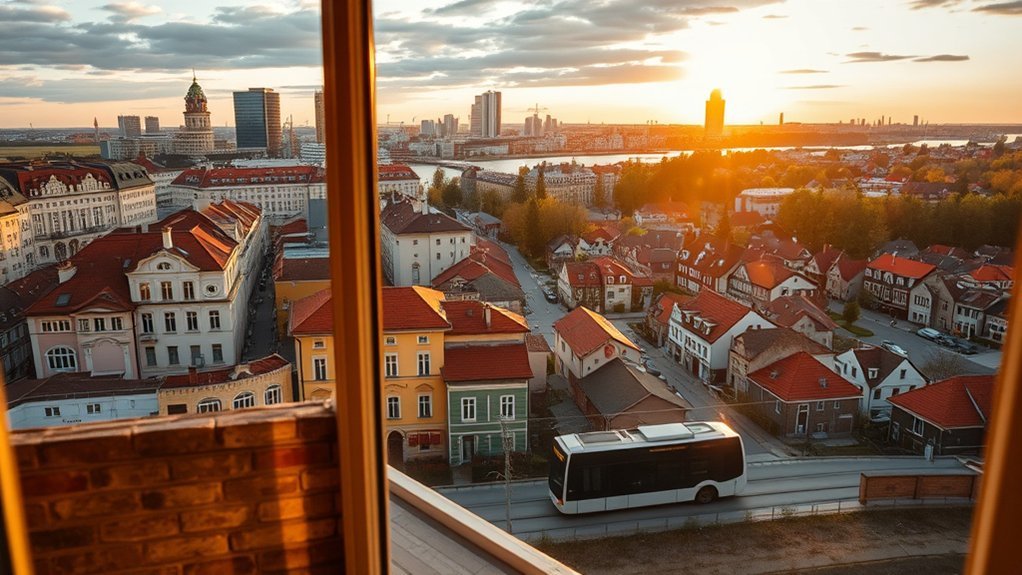
Now that you’ve estimated monthly non-rent costs, look at housing options to lock in your total budget: in Riga a 1‑bedroom city‑center flat averages €523.68/month while a small 1‑bed can be found for about €400, furnished studios near popular spots like Spice mall start from ≈€270, and larger 3‑bed apartments outside the center run near €645.45; add basic utilities (~€291.75/month) and internet (~€17.38/month) to compare total monthly outlays across these unit types.
You’ll use these figures to balance location, space, and cost. If you prioritize central access, expect higher rental prices but lower commute costs. Choosing a small 1‑bed or studio cuts rent considerably; a furnished studio is the most budget-friendly for short stays. A 3‑bed outside the center raises total monthly commitments but gives more living space. Factor in potential deposits, agency fees, and seasonal availability when planning. Below is a quick comparison to help you estimate monthly housing costs and decide which rental prices fit your needs.
| Unit type | Avg rent | Notes |
|---|---|---|
| Studio (furnished) | €270 | Near Spice mall |
| 1‑bed (small) | €400 | Affordable option |
| 1‑bed (center) | €523.68 | Central convenience |
| 3‑bed (outside) | €645.45 | More space |
Utilities, Internet, and Household Expenses
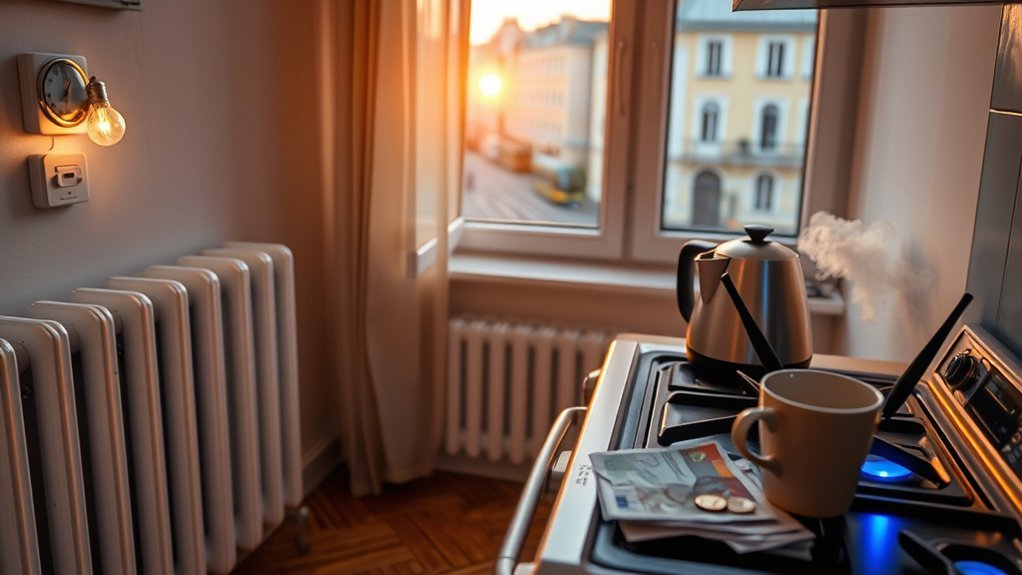
Expect your household utilities—electricity, heating and water—to average about €291.75 per month, and plan on around €17.38 monthly for a high‑speed (60 Mbps+) internet connection.
Compare those fixed costs to rent levels (from about €200 for single rooms to €523.68 for city‑center one‑bedrooms and €645.45 for three‑bedroom units outside center) since rent plus utilities can consume up to 60% of an average salary.
Also budget for routine household supplies (cleaning, toiletries, small appliances) which add a modest but steady monthly outlay.
Monthly Utility Breakdown
If you’re budgeting for a household in Latvia, plan on around €275 a month for family utilities (electricity, heating, water), with small apartments averaging about €291.75.
Add roughly €17.38 for a high‑speed internet plan and factor in rent differences—city‑center one‑bedrooms at about €523.68, three‑bedrooms outside center near €645.45, and single rooms from ≈€200—so total monthly housing and basic service costs typically range widely depending on size and location.
For practical planning, use these figures to estimate your average cost of living. Allocate utilities as a fixed monthly line, add internet, then layer rent by type.
Expect seasonal spikes from heating in winter; budget a buffer of 10–20% for variability and unexpected repairs.
Internet Plans and Costs
One clear monthly line item you should plan for is internet: a basic high‑speed plan (50 Mbps or more) runs about €17.38, which you can add to average small‑apartment utilities of roughly €291.75 to calculate core household service costs. You’ll find internet plans competitively priced; bundled deals with TV or mobile can lower overall bills. Factor the €17.38 into budget projections alongside rent and transport to evaluate affordability.
| Item | Monthly Cost | Notes |
|---|---|---|
| Internet (50+ Mbps) | €17.38 | Basic high‑speed plan |
| Utilities (small apt) | €291.75 | Electricity, heating, water |
| City transport (monthly) | €38.70 | Useful for commute comparisons |
Compare providers and check contract terms to avoid surprises.
Household Supplies Expenses
Start by tallying predictable monthly essentials: utilities (electricity, heating, water) average about €291.75. A 60+ Mbps internet plan runs roughly €17.38, and basic household supplies—groceries and personal care—add a variable but meaningful sum that, when combined with average city‑center rent of €523.68, can push housing and utilities up to 60% of a typical salary.
Use these figures to model your baseline living costs and identify where small adjustments (cheaper internet bundles, shopping habits, or energy conservation) will free up budget room. You should treat household supplies expenses as a control point: track recurring grocery and personal care spend, set weekly limits, buy seasonal/local produce, and compare stores.
Small, repeatable savings on supplies and energy quickly improve disposable income.
Grocery and Everyday Shopping Costs

You’ll find typical supermarket staples like 1 liter of whole milk for about €1.42 and a dozen large eggs for €3.01, which helps you budget weekly groceries.
Fresh produce is affordable — tomatoes at ~€2.95/kg and apples ~€1.32/kg — while 500 g of local cheese is roughly €1.63.
Expect household essentials and personal care items such as a 6‑day cold medicine for €5.32, a 12‑dose antibiotic pack for €11, and a men’s haircut in expat areas around €20.
Typical Supermarket Prices
Grocery bills in Latvia are noticeably budget-friendly: a liter of whole milk runs about €1.42, a dozen large eggs cost roughly €3.01, and apples are just €1.32 per kilogram.
You’ll find basic items priced to keep living costs lower than in many Western countries. A kilo of tomatoes is around €2.95, and 500 g of local cheese costs about €1.63, so you can plan meals affordably without sacrificing quality.
- Milk €1.42/L — staple for breakfasts and cooking.
- Eggs €3.01/12 — protein at a reasonable price.
- Apples €1.32/kg — cheap fruit option.
- Cheese €1.63/500g and tomatoes €2.95/kg — good value for meals.
Prices reflect practical, everyday shopping choices.
Fresh Produce Costs
Although prices vary by season and market, fresh produce in Latvia stays affordable: expect apples at about €1.32/kg and tomatoes near €2.95/kg, while staples like a liter of whole milk cost €1.42 and a dozen large eggs run about €3.01; local cheese (500 g) is roughly €1.63.
You’ll find fresh produce costs consistently lower than in many Western European cities, especially if you buy local and shop markets.
Plan for small weekly purchases to maximize freshness and minimize waste. Compare supermarket chains and farmer markets—chains offer convenience, markets often give better per‑kg deals during peak season.
For budgeting, allocate roughly €25–€40 per person weekly for basic fruits, vegetables, dairy and eggs, adjusting for diet and cooking habits.
Household Essentials Pricing
When you shop for household essentials in Latvia, expect consistently low prices on basics: a liter of whole milk runs about €1.42, a dozen large eggs €3.01, 1 kg of tomatoes €2.95, 1 kg of apples €1.32, and 500 g of local cheese €1.63.
Common personal‑care and health items—cold medicine for six days—cost roughly €5.32 and a 12‑dose antibiotic box about €11; a men’s haircut in expat areas is typically around €20.
You’ll find household essentials pricing stays competitive across supermarkets and local markets, so you can plan weekly budgets precisely. Consider these typical purchases to estimate monthly needs and reduce waste.
- Weekly milk and eggs: €5–€8
- Fresh produce basket: €10–€20
- Cheese and staples: €5–€12
- Personal care/meds: €6–€25
Eating Out, Entertainment, and Nightlife Prices
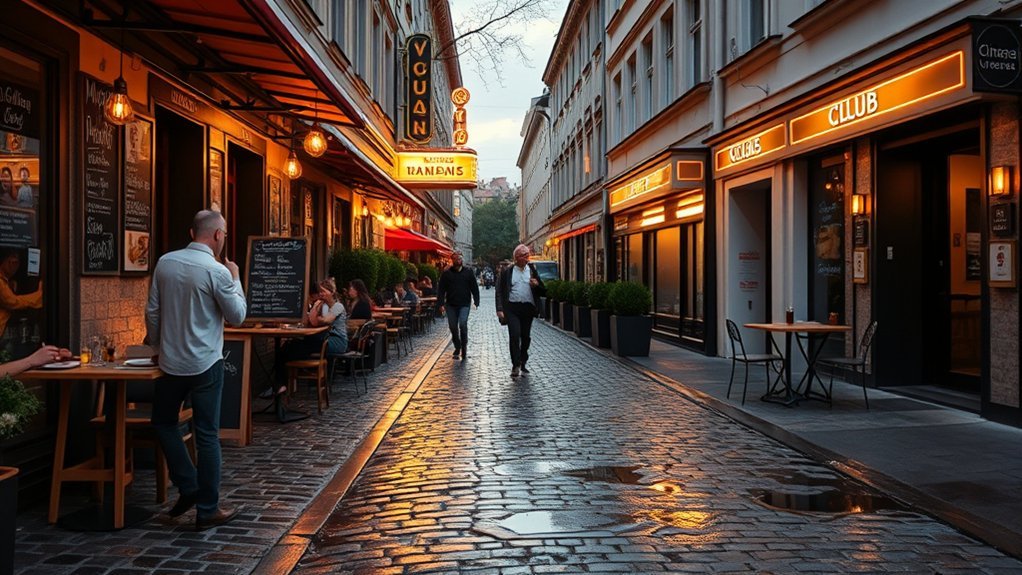
Eating out and going out in Latvia stays affordable: a basic pub dinner for two runs about €25, an Italian dinner about €68, and a downtown cocktail costs roughly €10, so you can mix low-cost and mid-range options without breaking the bank.
For eating out, you’ll find neighborhood pubs and casual restaurants deliver strong value; a €25 pub meal covers two main courses and a drink each in many areas.
Entertainment prices are varied but predictable: two movie tickets cost around €17, making cinema nights inexpensive. If you prefer higher-culture outings, top-tier theater seats will be about €100 for two, reflecting premium demand in Riga.
Nightlife is accessible: cocktails at €10 let you socialize without steep spending, though multiple drinks or club entry can raise the bill.
Transportation and Mobility Expenses
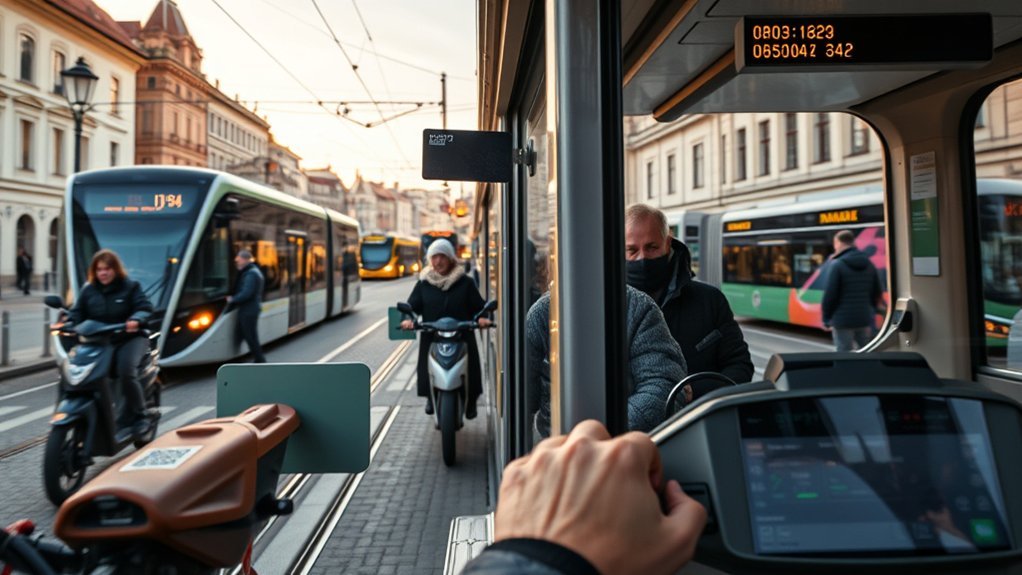
After a night out, getting around Latvia stays affordable and predictable: a single local transport ticket runs about $1.52 and a monthly pass about $38.70, so if you commute regularly you’ll save compared with pay-per-ride costs.
You’ll find transportation and mobility expenses here tilt toward public transit, which keeps monthly budgets steady and lower than many Western countries.
- Public transit: A $1.52 single fare and $38.70 monthly pass make daily commuting cost-effective and predictable.
- Taxis: An 8 km ride at roughly $9.38 is cheaper than in the U.S., useful for late nights or routes with poor connections.
- Driving: Petrol costs about $1.87 per liter, so factor higher fuel prices into car ownership expenses.
- Overall: With widespread public transportation and modest taxi fares, transportation and mobility expenses in Latvia remain economical for residents, letting you allocate more of your budget to housing or leisure without surprise travel costs.
Salaries, Job Market, and Purchasing Power
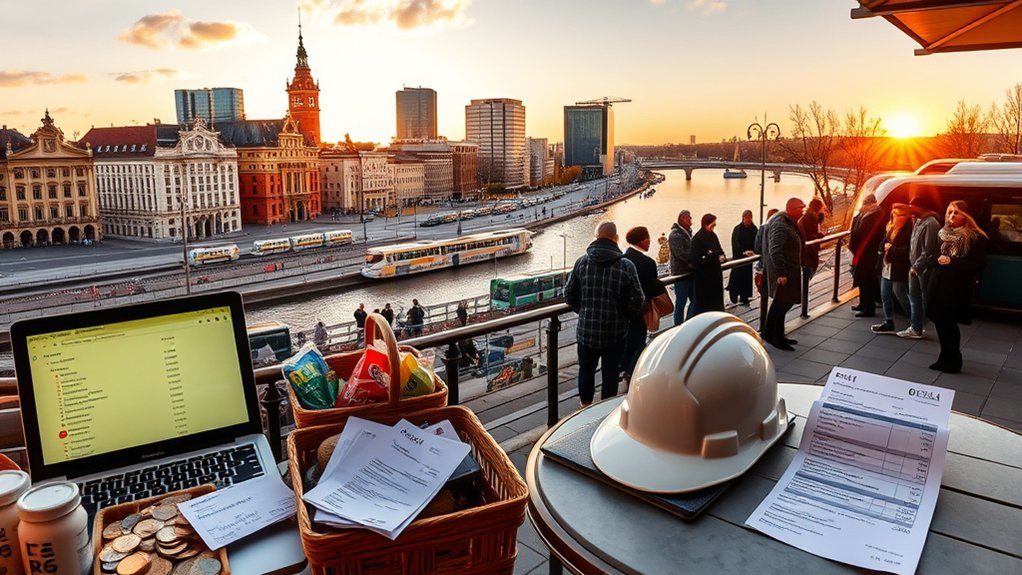
Although average take-home pay sits near €1,000 a month, earnings vary sharply — simple workers typically bring home about €800, specialists around €1,200, and self-employed people can sometimes reach €2,000, creating a wide income spread that shapes purchasing power and lifestyle choices.
You’ll find that these salaries translate into modest everyday budgets for many residents. With unemployment near 4%, job openings exist but are limited, especially for foreigners; knowing Latvian and Russian often determines whether you get hired.
Many young people leave for higher pay abroad, which affects the domestic talent pool and hiring dynamics. If you’re self-employed or in a specialist role, your purchasing power improves markedly, letting you cover rent, utilities, and moderate discretionary spending.
If you’re in a lower-paid job, you’ll need tighter budgeting or supplementary income. When evaluating living costs, match expected salaries to local prices and language requirements to realistically plan where you’ll fit in Latvia’s job market.
Living Standards, Healthcare, and Education
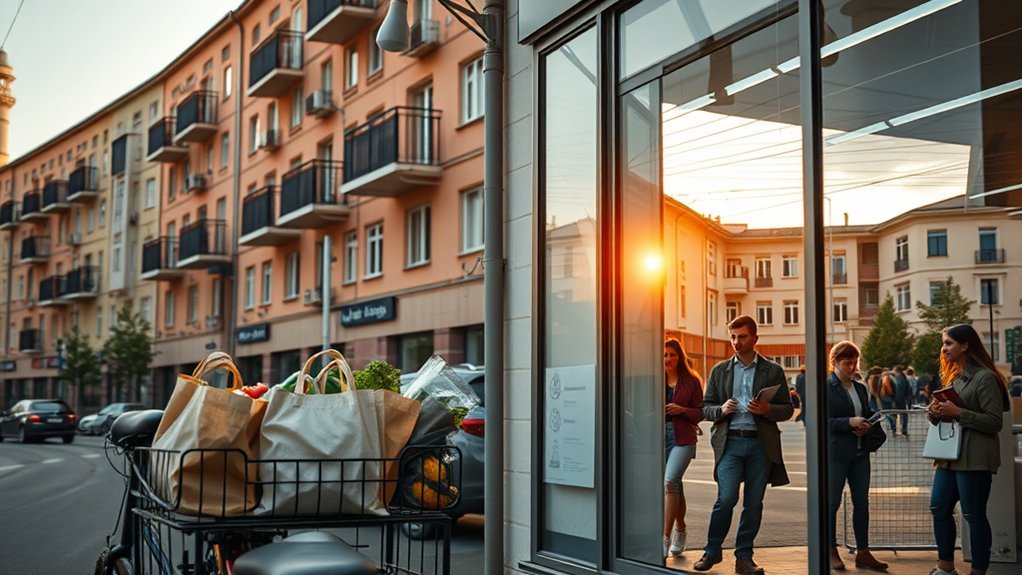
Those salary patterns shape how people experience living standards in Latvia: with an average monthly non-rent cost near €830 and a net salary around €900, many households face tight margins when rent and utilities are added.
You’ll find living standards that are modest but stable: essentials are affordable relative to Western Europe, yet discretionary spending is limited for many.
- Healthcare: private GP visits run about €40, so you’ll budget for care or rely on public services; six days of cold medicine averages €5.32.
- Education: primary schooling costs can reach €12,000 yearly, a major strain if you’re paying private or international school fees.
- Language and work: many speak English, but Latvian or Russian often matters for specialist jobs, which affects earnings and access to better living standards.
- Budgeting: with a €900 net salary, you’ll likely prioritize rent and utilities first, then healthcare and education as variable but significant expenses.
Frequently Asked Questions
Can a US Citizen Live in Latvia?
Yes — you can live in Latvia if you secure appropriate Visa Requirements or a residence permit; you’ll need proof of employment, funds, or family ties, and understanding Latvian/Russian improves job prospects and integration.
Is Latvia a Cheap Place to Live?
Yes — you’ll find Latvia relatively cheap; think of modest Baltic streets. Cost Comparison shows average monthly living around €830 excluding rent, lower rents, affordable groceries, dining, and utilities, so your everyday expenses stay manageable.
What Is the Average Rent in Latvia?
The average rent in Latvia is about €524 for a 1‑bedroom city center unit. Rental prices vary: small 1‑beds from €200, studios €270, larger units roughly €350–€645 depending on location and amenities.
Is Latvia a Good Place for Americans to Retire?
Yes — you’ll find Latvia affordable and practical for retirement: modest Retirement Benefits, low monthly expenses (~€830), accessible healthcare (~€40 visits), English-friendly cities, vibrant culture, and seasonal climate, though colder winters require adjustment.
Conclusion
You’ll find Latvia affordable compared with Western Europe: average monthly rent in Riga runs around €500–€700, groceries €200–€300, and a net salary averages €1,200–€1,400. Think of a friend who swapped a Berlin studio for a Riga flat and paid half the rent—she called it “buying time.” That extra time bought weekend trips, savings, and peace of mind. With modest wages but low costs, you can stretch income into a comfortable, pragmatic life.


